BusinessEurope Headlines No. 2016-41
The Single Market Information Tool misses the target
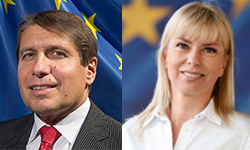 On 5 December, Markus J. Beyrer sent a letter to Commissioner Bieńkowska underlining BusinessEurope’s concerns with the initiative to create a Single Market Information Tool (SMIT). As announced in the Single Market Strategy, the SMIT aims to improve the functioning of the single market directly collecting market information from businesses. We agree that improving the implementation and application of the single market rules is an important objective. But requiring companies to respond mandatorily to information requests and potentially sanctioning them otherwise is an inefficient, overly burdensome and disproportionate way of achieving that objective, particularly as the success of a well-functioning single market relies largely upon the member states.
On 5 December, Markus J. Beyrer sent a letter to Commissioner Bieńkowska underlining BusinessEurope’s concerns with the initiative to create a Single Market Information Tool (SMIT). As announced in the Single Market Strategy, the SMIT aims to improve the functioning of the single market directly collecting market information from businesses. We agree that improving the implementation and application of the single market rules is an important objective. But requiring companies to respond mandatorily to information requests and potentially sanctioning them otherwise is an inefficient, overly burdensome and disproportionate way of achieving that objective, particularly as the success of a well-functioning single market relies largely upon the member states.
![]() Contact: Guido Lobrano
Contact: Guido Lobrano
Labour provisions in trade agreements –an effective tool to promote sustainability?
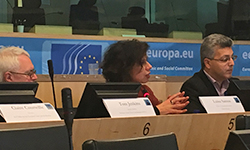 There are different options to achieve sustainability. Firstly, there is the economic school of thought, where companies engage in trade and they operate in Global Value Chains. They promote high-level labour and environmental standards through their CSR policies. Sustainability is therefore part of their business models. Secondly, there is the political angle to achieve sustainability. This is where trade agreements enter into the scene involving directly governments. This was one of the key messages of BusinessEurope International Relations Director Luisa Santos during the European Commission & International Labour Organization Seminar ‘Labour Provisions in Trade Agreements: design, implementation and stakeholder involvement’ that took place on 6 December in Brussels. She added that, of course the EU is negotiating with many trading partners that have different levels of development and different approaches to sustainability. The question is: what is the EU’s leverage in successfully pursuing sustainability through trade agreements? Although it is very important that the EU has a value-driven trade agenda, at the same time, we have to acknowledge that there are limits to what we can achieve through trade agreements. Drawing from the experiences we have from existing monitoring mechanisms under trade agreements, we can identify a few lessons for the future exercises: (1) stakeholder participation is essential, (2) the representativeness and independence of the civil society organisations that participate should be further reinforced and (3) results need to be achieved through improved dialogue and cooperation, in order to identify concerns earlier and push for solutions at the highest political level in a consistent manner.
There are different options to achieve sustainability. Firstly, there is the economic school of thought, where companies engage in trade and they operate in Global Value Chains. They promote high-level labour and environmental standards through their CSR policies. Sustainability is therefore part of their business models. Secondly, there is the political angle to achieve sustainability. This is where trade agreements enter into the scene involving directly governments. This was one of the key messages of BusinessEurope International Relations Director Luisa Santos during the European Commission & International Labour Organization Seminar ‘Labour Provisions in Trade Agreements: design, implementation and stakeholder involvement’ that took place on 6 December in Brussels. She added that, of course the EU is negotiating with many trading partners that have different levels of development and different approaches to sustainability. The question is: what is the EU’s leverage in successfully pursuing sustainability through trade agreements? Although it is very important that the EU has a value-driven trade agenda, at the same time, we have to acknowledge that there are limits to what we can achieve through trade agreements. Drawing from the experiences we have from existing monitoring mechanisms under trade agreements, we can identify a few lessons for the future exercises: (1) stakeholder participation is essential, (2) the representativeness and independence of the civil society organisations that participate should be further reinforced and (3) results need to be achieved through improved dialogue and cooperation, in order to identify concerns earlier and push for solutions at the highest political level in a consistent manner.
Contact: Luisa Santos or Sofia Bournou
Remove obstacles to road transport in the single market
 BusinessEurope is concerned about recent developments in a number of member states resulting in new obstacles to international transport operations, which are considerably affecting free movement in the single market. This was underlined by Director General Markus J. Beyrer in a letter sent on 6 December to Transport Commissioner Violeta Bulc and Director General Henrik Hololei of DG MOVE. Road transport is one of the most heavily regulated sectors in the EU. Transport and logistics companies need simpler, predictable, more transparent and clearer rules to the benefit of customers across the single market. This will also make legislation more easily enforceable. BusinessEurope therefore urges the Commission to decisively address the outstanding challenges for road freight and passenger transport in the single market, often related to road charging, social aspects, safety, market access, investment and the enforcement of existing rules.
BusinessEurope is concerned about recent developments in a number of member states resulting in new obstacles to international transport operations, which are considerably affecting free movement in the single market. This was underlined by Director General Markus J. Beyrer in a letter sent on 6 December to Transport Commissioner Violeta Bulc and Director General Henrik Hololei of DG MOVE. Road transport is one of the most heavily regulated sectors in the EU. Transport and logistics companies need simpler, predictable, more transparent and clearer rules to the benefit of customers across the single market. This will also make legislation more easily enforceable. BusinessEurope therefore urges the Commission to decisively address the outstanding challenges for road freight and passenger transport in the single market, often related to road charging, social aspects, safety, market access, investment and the enforcement of existing rules.
![]()
![]() Contact: Jeroen Hardenbol
Contact: Jeroen Hardenbol
EU Agencies and their contribution to growth
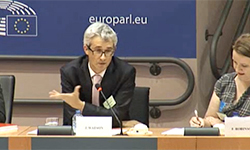 “The EU’s agencies play an important role in enabling growth and employment, but must ensure their regulatory proposals are backed up by strong impact assessments’, was the key message from BusinessEurope’s Economics Director James Watson speaking at the EU Agencies Forum on 6 December. The event, which was held in the European Parliament, brought together staff and stakeholders from the EU’s network of 45 agencies, with Parliament President Martin Schultz providing the key note speech. During the panel on ‘Boosting Jobs, Growth and Investment’, James noted the extensive interactions that BusinessEurope has with agencies involved in the issues ranging from skills to intellectual property, to health and safety and financial regulation and the important impact that this work can have in helping enable stronger growth in the EU.
“The EU’s agencies play an important role in enabling growth and employment, but must ensure their regulatory proposals are backed up by strong impact assessments’, was the key message from BusinessEurope’s Economics Director James Watson speaking at the EU Agencies Forum on 6 December. The event, which was held in the European Parliament, brought together staff and stakeholders from the EU’s network of 45 agencies, with Parliament President Martin Schultz providing the key note speech. During the panel on ‘Boosting Jobs, Growth and Investment’, James noted the extensive interactions that BusinessEurope has with agencies involved in the issues ranging from skills to intellectual property, to health and safety and financial regulation and the important impact that this work can have in helping enable stronger growth in the EU.
Contact: James Watson
The Single Digital Gateway could be the one-stop shop businesses are calling for
 On 8 December, Markus J. Beyrer sent a letter to Commissioner Bieńkowska outlining BusinessEurope’s views on the initiative to create a Single Digital Gateway (SDG). As announced in the Digital Single Market and Single Market Strategy, the SDG aims to streamline existing single market tools to offer information and problem solving services for businesses operating across borders and on the home market. The initiative answers our call to create an online one-stop shop for goods and services. The success of its use by businesses operating in Europe will rely upon the efficiency of its interface, the maintenance of its content and the resources spent on it by the Commission and the member states. Companies and in particular start-ups and SMEs need to be closely involved in the development of the gateway to ensure it truly meets business’ needs.
On 8 December, Markus J. Beyrer sent a letter to Commissioner Bieńkowska outlining BusinessEurope’s views on the initiative to create a Single Digital Gateway (SDG). As announced in the Digital Single Market and Single Market Strategy, the SDG aims to streamline existing single market tools to offer information and problem solving services for businesses operating across borders and on the home market. The initiative answers our call to create an online one-stop shop for goods and services. The success of its use by businesses operating in Europe will rely upon the efficiency of its interface, the maintenance of its content and the resources spent on it by the Commission and the member states. Companies and in particular start-ups and SMEs need to be closely involved in the development of the gateway to ensure it truly meets business’ needs.
![]() Contact: Patrick Grant
Contact: Patrick Grant
European Week puts spotlight on vocational skills
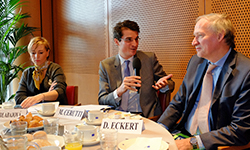 “The adaptation of national apprenticeship systems to make them more demand-driven and cost-effective is essential for fostering the engagement of companies in offering apprenticeships. A key element of this is shortening the time that it takes for companies to see a return on their investment. This is particularly important for SMEs who have fewer human and financial resources to invest in training,” said Maxime Cerutti, Director of Social Affairs, during a meeting of the European Parliament’s SME Intergroup on 6 December hosted by MEP Grapini. This meeting was co-sponsored by BusinessEurope and Eurochambres and took place in the context of the first European Vocational Skills Week, which runs from 5-9 December. The Week aims to promote vocational education and training (VET) and to raise awareness about the employment opportunities that VET can bring. BusinessEurope was active throughout the week, inviting the Commission and other stakeholders to act upon the recently adopted tripartite opinion of national governments, employers and trade unions on a “Shared Vision for Quality and Effective Apprenticeships and Work-based Learning”.
“The adaptation of national apprenticeship systems to make them more demand-driven and cost-effective is essential for fostering the engagement of companies in offering apprenticeships. A key element of this is shortening the time that it takes for companies to see a return on their investment. This is particularly important for SMEs who have fewer human and financial resources to invest in training,” said Maxime Cerutti, Director of Social Affairs, during a meeting of the European Parliament’s SME Intergroup on 6 December hosted by MEP Grapini. This meeting was co-sponsored by BusinessEurope and Eurochambres and took place in the context of the first European Vocational Skills Week, which runs from 5-9 December. The Week aims to promote vocational education and training (VET) and to raise awareness about the employment opportunities that VET can bring. BusinessEurope was active throughout the week, inviting the Commission and other stakeholders to act upon the recently adopted tripartite opinion of national governments, employers and trade unions on a “Shared Vision for Quality and Effective Apprenticeships and Work-based Learning”.
Contact: Robert Plummer
Discussing Green Taxes at the European Economic and Social Committee
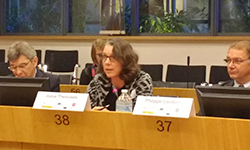 The chair of BusinessEurope’s Green Tax Group and Tax Policy Manager at Shell Oil Company Ann Theeuwes participated in a panel discussion ‘Towards a common EU tax policy in favour of the green energy sector’ on 1 December. This event, jointly organised by the European Economic and Social Committee, Louvain University and CEU San Pablo University, focused on the potential role of tax policy in encouraging positive behaviour. Ann noted that the objectives of environmental taxes need to be well defined and clear from the start, and she pointed out the danger that the mix between regulation and tax may end up delivering contradictory results. BusinessEurope believes that any environmental taxes need to be carefully designed given the dangers of increasing firms’ production costs, reducing investment, damaging global competitiveness and lowering employment.
The chair of BusinessEurope’s Green Tax Group and Tax Policy Manager at Shell Oil Company Ann Theeuwes participated in a panel discussion ‘Towards a common EU tax policy in favour of the green energy sector’ on 1 December. This event, jointly organised by the European Economic and Social Committee, Louvain University and CEU San Pablo University, focused on the potential role of tax policy in encouraging positive behaviour. Ann noted that the objectives of environmental taxes need to be well defined and clear from the start, and she pointed out the danger that the mix between regulation and tax may end up delivering contradictory results. BusinessEurope believes that any environmental taxes need to be carefully designed given the dangers of increasing firms’ production costs, reducing investment, damaging global competitiveness and lowering employment.
Contact: Pieter Baert
Calendar
 8 December 2016: Employment, Social Policy, Health and Consumer Affairs Council
8 December 2016: Employment, Social Policy, Health and Consumer Affairs Council- 11 December 2016: Romanian parliamentary elections
- 12 - 15 December 2016: EP Plenary, Strasbourg
- 12 December 2016: Foreign Affairs Council
- 15 December 2016: European Council